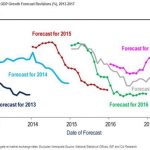After another difficult Asian session that saw the Nikkei fell 4.8% (12.3% on the week), the capital markets against have stabilized in Europe. Equity markets are mostly higher, with the Dow Jones Stoxx 600 up nearly 2% led by energy and financials.

Oil prices are up a bit more than $1 a barrel though it still leaves Brent off almost $3 on the week and WTI off $3.6. This follows yesterday’s close, which was the lowest since 2003. Talk that the drop in price is increasing pressure on producers. Moody’s warned that the drop the fall in prices is jeopardizing the Russian budget, and Venezuela is facing challenges to service its external debt, forcing continued liquidation of its gold.
With the stabilization of equity market and oil, the flight into core bonds has slowed, and yields are mostly a couple of basis points higher though gilts are under-performing. Italian and Spanish yields are a few basis point lower. Portugal remains under pressure. The benchmark yield is up five basis points to bring this week’s increase to 75 bp. The Eurogroup issued a statement yesterday indicating that additional measures will be implemented to reduce the deficit and that the proposed steps will be reviewed in the Spring,
The eurozone expanded by 0.3% in Q4 15, as expected for a 1.5% year-over-year pace. If anything, this is on the high side of estimates of trend growth. Breakdowns are not available with the first release, but it does appear that growth was driven primarily domestically rather than exports. However, Q4 ended on a soft note as evidenced by the 1.0% fall in December’s industrial output. While this is well below the 0.3% consensus, weak national reports, including Germany, France, and Italy, suggest the surprise was not as great as it may appear.
The euro peaked yesterday near $1.1375 and is nearly a cent lower, which still leaves it up on the week by a 1.25 cents. A break of $1.12 is needed to begin carving out a top. The dollar is flattish against the yen near JPY112.60. A move above JPY113.00 is needed to suggest something more than simply bouncing along the trough. Despite the dramatic intraday move yesterday, few think the BOJ actually intervened. Talk that the MOF’s Asakawa met with Prime Minister Abe continues to keep many participants, and the media focused on intervention.











Leave A Comment